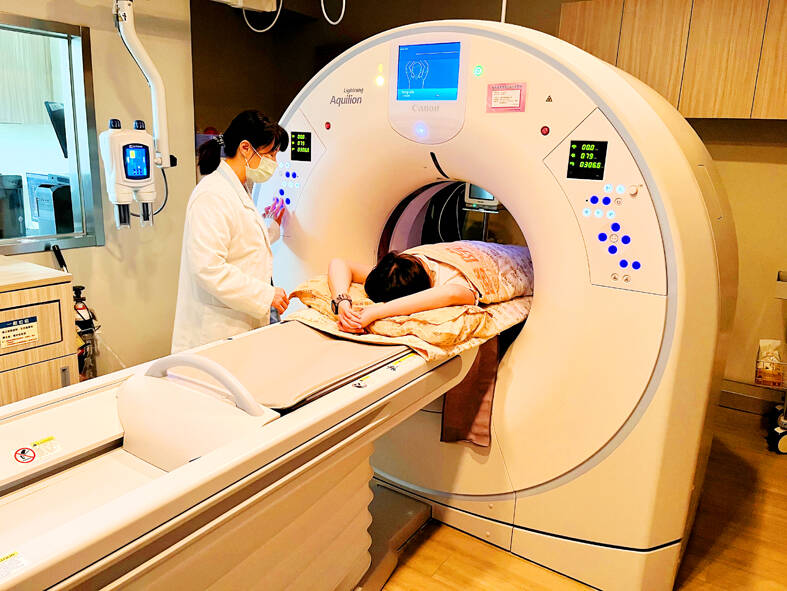The number of cancer diagnoses in the nation has dropped and lung cancer has replaced colon cancer as the most common type, data released by Ministry of Health and Welfare yesterday showed.
According to statistics from 2021, men diagnosed with cancer numbered at 63,723, while the age-standardized incidence rate was 330.8 per 100,000 people, down 5.4 compared with 2020.
Women diagnosed with cancer numbered at 58,039, while the age-standardized incidence rate was 288.4 per 100,000 people, down 4.4 from 2020.

Photo courtesy of the Taoyuan of Department of Public Health
Compared with 2020, higher rates of skin cancer were seen among women, which is the eighth most common cancer in the nation, the data showed.
Health Promotion Administration (HPA) Director-General Wu Chao-chun (吳昭軍) said the ranking was due to the drop in colon cancer cases and increased testing for lung cancer.
Third and fourth-stage lung cancer diagnoses rose 11.1 percent and 50.2 percent respectively from 2020, while early-stage cancer diagnoses increased from 13.7 percent in 2020 to 35.4 percent, HPA Cancer Prevention Division Director Lin Li-ju (林莉茹) said.
The HPA said it is working on the fifth phase of its national cancer prevention program and has commissioned experts to assess whether there are other risk factors to consider and if cancer screening efforts would have to be expanded.
The fifth phase includes reinforcing cancer screening capabilities and timely treatment, Lin said.
The number of people diagnosed with lung cancer rose each year from 2017 to 2021, while the age-standardized incidence rate grew to 39.7 per 100,000, the HPA said.
The decrease in diagnoses of liver and colon cancer shows that the nation’s efforts to treat the cancers have been successful, Wu said.
However, overall cancer screening in 2021 dropped due to the COVID-19 pandemic, and statistics in coming years would have to be taken into account to gauge whether lung cancer has truly become more prevalent, Wu added.
Free low-dose computed tomography (LDCT), made available to high-risk groups from July 1 last year, might have also been a factor in increasing lung cancer diagnoses, Wu added.
Free LDCT screenings could increase the number of lung cancer diagnoses in the next two to three years, National Taiwan University Hospital Department of Surgery chairman Chen Jin-shing (陳晉興) said.
The public should not be too concerned over the rising rates, as this indicates heightened awareness and could lead to a reduction of mortality rates in the long run, he said.
The increase in lung cancer diagnoses among women suggests the prevalence of indoor pollutants, he said.

CHAMPIONS: President Lai congratulated the players’ outstanding performance, cheering them for marking a new milestone in the nation’s baseball history Taiwan on Sunday won their first Little League Baseball World Series (LLBWS) title in 29 years, as Taipei’s Dong Yuan Elementary School defeated a team from Las Vegas 7-0 in the championship game in South Williamsport, Pennsylvania. It was Taiwan’s first championship in the annual tournament since 1996, ending a nearly three-decade drought. “It has been a very long time ... and we finally made it,” Taiwan manager Lai Min-nan (賴敏男) said after the game. Lai said he last managed a Dong Yuan team in at the South Williamsport in 2015, when they were eliminated after four games. “There is

Taiwan Semiconductor Manufacturing Co (TSMC, 台積電) is expected to start construction of its 1.4-nanometer chip manufacturing facilities at the Central Taiwan Science Park (CTSP, 中部科學園區) as early as October, the Chinese-language Liberty Times (the Taipei Times’ sister newspaper) reported yesterday, citing the park administration. TSMC acquired land for the second phase of the park’s expansion in Taichung in June. Large cement, construction and facility engineering companies in central Taiwan have reportedly been receiving bids for TSMC-related projects, the report said. Supply-chain firms estimated that the business opportunities for engineering, equipment and materials supply, and back-end packaging and testing could reach as high as

POWER PLANT POLL: The TPP said the number of ‘yes’ votes showed that the energy policy should be corrected, and the KMT said the result was a win for the people’s voice The government does not rule out advanced nuclear energy generation if it meets the government’s three prerequisites, President William Lai (賴清德) said last night after the number of votes in favor of restarting a nuclear power plant outnumbered the “no” votes in a referendum yesterday. The referendum failed to pass, despite getting more “yes” votes, as the Referendum Act (公民投票法) states that the vote would only pass if the votes in favor account for more than one-fourth of the total number of eligible voters and outnumber the opposing votes. Yesterday’s referendum question was: “Do you agree that the Ma-anshan Nuclear Power Plant

Democratic nations should refrain from attending China’s upcoming large-scale military parade, which Beijing could use to sow discord among democracies, Mainland Affairs Council Deputy Minister Shen You-chung (沈有忠) said. China is scheduled to stage the parade on Wednesday next week to mark the 80th anniversary of Japan’s surrender in World War II. The event is expected to mobilize tens of thousands of participants and prominently showcase China’s military hardware. Speaking at a symposium in Taichung on Thursday, Shen said that Chinese Minister of Foreign Affairs Wang Yi (王毅) recently met with Indian Prime Minister Narendra Modi during a visit to New Delhi.